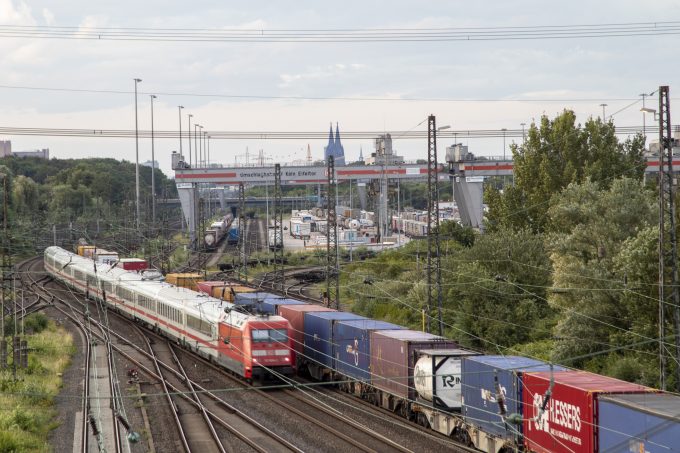Supervisory board of Deutsche Bahn approves sale of logistics subsidiary DB Schenker to DSV
Supervisory Board of Deutsche Bahn AG approves sale of logistics subsidiary DB Schenker to DSV Chairman ...
GM: RAISING THE ROOF GGM: IN FULL THROTTLE GZIM: MAERSK BOOST KNIN: READ-ACROSSMAERSK: NOT ENOUGHMAERSK: GUIDANCE UPGRADEZIM: ROLLERCOASTERCAT: HEAVY DUTYMAERSK: CATCHING UP PG: DESTOCKING PATTERNSPG: HEALTH CHECKWTC: THE FALLGXO: DEFENSIVE FWRD: RALLYING ON TAKEOVER TALKODFL: STEADY YIELDVW: NEW MODEL NEEDEDWTC: TAKING PROFIT
GM: RAISING THE ROOF GGM: IN FULL THROTTLE GZIM: MAERSK BOOST KNIN: READ-ACROSSMAERSK: NOT ENOUGHMAERSK: GUIDANCE UPGRADEZIM: ROLLERCOASTERCAT: HEAVY DUTYMAERSK: CATCHING UP PG: DESTOCKING PATTERNSPG: HEALTH CHECKWTC: THE FALLGXO: DEFENSIVE FWRD: RALLYING ON TAKEOVER TALKODFL: STEADY YIELDVW: NEW MODEL NEEDEDWTC: TAKING PROFIT

European intermodal services are facing further delays from strike action by German rail workers angry at employers “seeking to heap the cost of the pandemic onto staff”.
Action by members of the German Train Drivers’ Union (GDL) last Wednesday and Thursday stopped 300 Deutsche Bahn Cargo (DB) domestic trains from running, the impact felt widely across the continent, and further action is in the pipeline.
A spokesperson for the rail operator said: “The strike by GDL inflicted serious damage on Germany’s rail freight operations and caused major inconvenience to customers.
“The strike represents a setback for climate-friendly rail freight, causing uncertainty for customers, who might react by threatening to move their transport activities back to road haulage. We are working flat out to tackle the backlog of trains.”
But secretary of state for transport Enak Ferlemann believes the situation will be “difficult to defuse in the short term”.
With the GDL set to stage a demonstration in central Berlin on Friday and warning of further strikes, shippers are becoming increasingly anxious, especially after seeing supply chains hobbled by last month’s floods across northern Europe.
GDL animosity towards DB was inflamed after the operator refused to approve a €600 bonus for staff who, said the union, “kept trains going” during the pandemic while executives were paid “handsomely”.
The union noted the bonus decusion was the the “cherry on top” when it came to the “meagre treatment of staff”, a recent cut to their pensions suggesting they were being forced to bear the cost of the pandemic while “those safe at home get rich”.
A spokesperson said: “For many colleagues, the cut means a loss of around a third of their occupational pension, to about €150. At the same time, the executives have secured up to €20,000 for their pensions. And now employees already affected by shift work are being asked to accept a further deterioration in working hours and ordered to work even more flexibly than before.”
Such is the level of discontent that, on a 70% turnout, 95% of members voted in favour of strike action, calling for restoration of pensions, a 3.2% wage increase and the one-time bonus.
However, with the much larger EVG train workers union having struck an agreement with DB last year, many commentators are suggesting the GDL’s negotiation task will be much harder.
EVG head Klaus-Dieter Hommel told a German radio station: “This action is now about the existence of the GDL; but if it gets a better offer, we will have to renegotiate ours.”
DB head of HR Martin Seiler said: “DB fully believes we can find solutions quickly if we sit down at the negotiating table; we are willing to do so.
“Collective bargaining parties have to work together to make progress. Right now is the time for GDL to show it has the courage to finally come to the table and address the facts of the most serious economic crisis in our company’s history. Threatening rail operations with more industrial action in the current situation does nothing to find a way forward. It is completely unnecessary and disproportionate.”
Mr Seiler also claimed DB had agreed to meet the union’s call for a 3.2% pay increase, “just in a different timeframe”, but the GDL described the offer as deceptive, noting the wait time would have a very real impact on the workforce.
“If the employer wants to end the labour disputes sustainably, he must submit a negotiable offer to the GDL as soon as possible,” said GDL chair Claus Weselsky.
“The railway workers deserve recognition and appreciation of their work. DB must finally invest taxpayers’ money in railway workers, in the future of the railway system and in the climate targets.”
Comment on this article